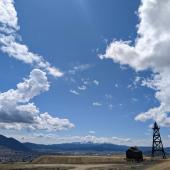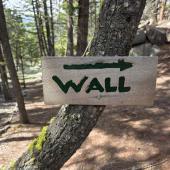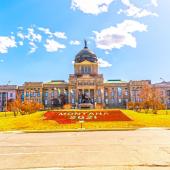Wild West Words: Bee, Grizzly, Homestead
The Curious Origins of the Words Bee, Grizzly, Homestead
BEE

A uniquely American institution, the bee, grew up around the tradition of neighbors uniting in a common task. The Oxford English Dictionary’s historical database dates the earliest citation of the word bee in this communal context at 1769, in the Boston Gazette. “Last Thursday about twenty young Ladies met…on purpose for a Spinning Match (or what is called, in the Country, a Bee).”
In the years to follow, written documents detail corn-husking bees, apple bees, raising bees for barn building, quilting, wood-chopping, road-building and candy-making bees.
In 1850, the term “spelling bee” appeared for the first time in The Knickerbocker, a monthly magazine published in New York City. That it was encased in quotation marks indicates the term was relatively new in 1850. Since then, the spelling bee has become a thriving institution, and is one of the last American communal events to be called a bee. We haven’t attached this notion to our 21st century collective activities; for example, there are no wine-tasting nor Scrabble nor basketball bees, and harvesting bees in a mechanized age seem quaint and old-fashioned.
So before this term becomes obsolete, let’s look at its origin. Some word watchers contend the term was inspired by the activities of organized and efficient bee societies. Other etymological evidence points to an older dialectal English word been (pronounced BEE-in), meaning “voluntary help.”
GRIZZLY

Standing bipedally at eight feet and moving its 400-plus pounds across the landscape with the confidence of a fearless marauder, the grizzly bear inspires respect, awe and fear in the humans with whom it shares a habitat. In addition, we have a fascination with the animal that is so like us. The grizzly eats the foods we like: meat, fruit, seeds, plants, fats, sugars. Anthropomorphically playful and curious, it is also fiercely protective of its young. Individual bears, like humans, can be perilously unpredictable.
Meriwether Lewis was one of the first European-Americans to interact with the grizzly bear and live to tell his tales. Encamped at the Great Falls of the Missouri on July 15, 1805, Lewis wrote in his journal that the grizzly is “a most tremendous animal,” and that only providence kept his men from falling “sacrifice to [its] ferocity.”
Such sentiments, typical of early accounts of the animal, inspired American naturalist and ornithologist George Ord, in 1815, to give the animal its scientific name Ursus horribilis, “horrible bear.” Horribilis derives from the Latin verb horrere, to “tremble, quake, dread, loathe.”
The first mention of the bear’s common name, grizzly, has been traced to the journals of Patrick Gass, a sergeant in the Lewis and Clark Expedition, who called the “grizly” a “bold and farocious” animal. Grizzly, meaning “grey-haired” must have seemed, to 19th century American English speakers, an appropriate moniker for a creature with the silver-tipped fur typical of many individuals
HOMESTEAD

It was a radical new concept with a name steeped in tradition. The Homestead Act, passed and signed by President Lincoln in 1862, enabled any U.S. citizen, male or female, 21 years of age or older, to claim 160 acres of contiguous government land. The title to those acres would be awarded to the applicant after he/she had built a home and lived on the claim for five years.
From 1862 through the nineteen-teens, hundreds of thousands of would-be settlers rushed into the sunset to establish a home and a farm on essentially free acreage. This tidal wave of settlement changed the pattern of human habitation in the American West. The arid eastern Montana prairie, for example, which had for millennia been sparsely populated by nomadic peoples, proved unsuitable for the intensive farming technologies imported from the East and the Midwest.
The very title “Homestead Act” deeply enthralled English speakers, encouraging them to remain on even the most stubbornly unproductive land. The term homestead, appearing in Old English documents by the 900s, implies settlement and permanent residence. The stead in homestead arises from the Old English stede, meaning “place, position; firmness, stability, fixity.” Related are the words steady, “firmly fixed,” and steadfast, “firm in its place.” To stay in a fixed residence in order to make it one’s own: this was the practical and the etymological promise of the Homestead Act.
The word homestead, for so long a noun, was teased into a verb by 1867, when American author Wilson Nicely, in his book Great Southwest, Plain Guide for Emigrants and Capitalists wrote, “Millions of acres in the State are yet lying vacant, to be homesteaded at $16 for 160 acres.” Close on the heels of this new verb came the useful noun homesteader. It first appeared in print in the publication North American & United States Gazette (Philadelphia) on June 13, 1870: “The bill would repeal the requirement in the charter of the Union Pacific for the sale of lands to homesteaders.”












Leave a Comment Here